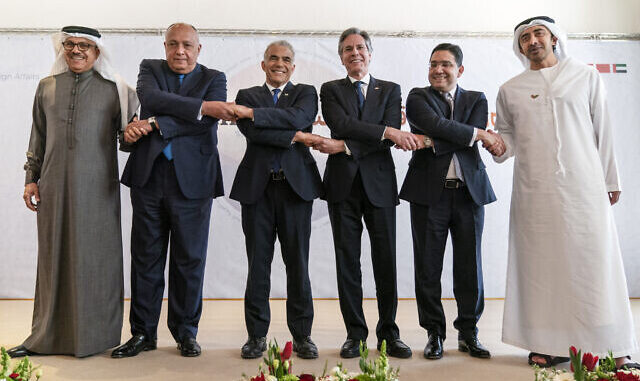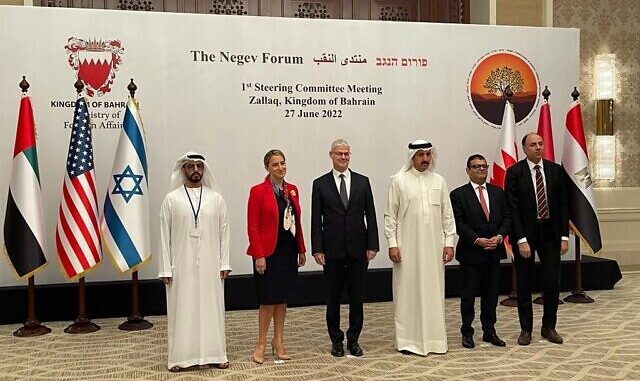T. Belman. Jordan and the PA won’t be missed except by the US.
As teams from Israel, Arab allies meet in UAE this week, senior US official says Arab states will be keeping eye on policies of new hardline Israeli government
By JACOB MAGID, TOI 8 January 2023, 4:02 pm

Closing their talks at the Negev Summit, (from left) Bahrain’s Foreign Minister Abdullatif bin Rashid al-Zayani, Egypt’s Foreign Minister Sameh Shoukry, Israel’s Foreign Minister Yair Lapid, US Secretary of State Antony Blinken, Morocco’s Foreign Minister Nasser Bourita, and United Arab Emirates’ Foreign Minister Sheikh Abdullah bin Zayed Al Nahyan, March 28, 2022, in Sde Boker, Israel. (AP Photo/Jacquelyn Martin, Pool)
A senior State Department official lamented Jordan’s expected absence at the latest Negev Forum gathering of Israel and its Arab allies that will take place on Monday and Tuesday in Abu Dhabi.
Jordan will be the only Arab country with full diplomatic relations with Israel that will not be sending a delegation to the United Arab Emirates where, for the first time, interagency teams known as working groups will be gathering from the US, Israel, the UAE, Bahrain, Morocco and Egypt to discuss joint regional projects in a variety of fields.
The cooperative commenced last March with a meeting of the countries’ foreign ministers in the southern Israeli town of Sde Boker, followed by a June in-person gathering and an October virtual one of a lower-level steering committee that is coordinating the various initiatives produced by the forum.
Jordan has held firm in its position against joining the Negev Forum so long as the Palestinians will not be participating alongside them — a stance that has led to a dead-end, given the Palestinian Authority’s refusal to openly cooperate with an initiative it views as part of an effort to sideline its cause.
“There’s an empty chair at the table because Jordan obviously has a peace agreement with Israel,” the senior US official said, briefing The Times of Israel days before the working group meetings.
While Israeli officials who spoke with The Times of Israel in October expressed optimism that Jordan would come around and participate in the Negev Forum in some fashion — perhaps by sending an observer delegation — the senior US official said that would not be the case in Abu Dhabi this week.
Prime Minister Benjamin Netanyahu has long had a rocky relationship with Jordan and his first week back in office was no exception. Amman summoned Israel’s ambassador last week to protest National Security Minister Itamar Ben Gvir’s visit to the Temple Mount and issued fiery statements lambasting Israel’s new right-wing government over the move.
Advocates of the Negev Forum argue that Jordan only stands to lose by remaining on the sidelines as the regional projects move forward. The US is not giving up on folding the Hashemite kingdom into the collaborative and US Secretary of State Antony Blinken raised the issue in a phone call with Jordanian Foreign Minister Ayman Safadi on Friday.
The senior State Department official said that the Biden administration is also briefing the PA on developments at the Negev Forum and will continue to do, even though Ramallah is not sending a delegation.
Notably though, Palestinian officials have not been speaking out against the Negev Forum in the way that they criticized the US-brokered Abraham Accords normalization agreements that Israel signed with the UAE, Bahrain and Morocco in 2020.
Two Arab diplomats from participating countries said that the previous Israeli government pushed back on the idea of including the PA as an equal member of the forum, though the Palestinians had not sought such a role. That Israeli position is not likely to change with Netanyahu back at the helm, given that most members of his coalition oppose a two-state solution and have shown less interest in cooperating with the PA.
Still, the senior US official said that the working groups will seek to advance projects that can also boost the Palestinian economy and improve Palestinians’ livelihood. “You’ll likely see projects that are not targeted specifically at the Palestinians per se, but broader regional projects that [the Palestinians] will be able to benefit from just like the other countries involved in [the forum].”
The official clarified that the Negev Forum “is not a substitute for efforts on the Israeli-Palestinian front” — a long-held Biden administration position.
While the new Israeli government has expressed its desire to pick up where the previous one left off in advancing regional integration efforts, that may prove difficult if it simultaneously furthers some of its guiding principles, including expanding Israel’s presence in the West Bank.
The senior State Department official declined to speculate as to how such efforts might impact the Negev Forum, but said “our Arab partners will be watching closely” to see how Netanyahu’s coalition governs.
Each of the other five Negev Forum countries condemned Israel for Ben Gvir’s Temple Mount visit, though an Israeli Foreign Ministry official said last week that it didn’t impact preparations for the Abu Dhabi meetings.
Alongside the differences other members countries have with Israel, the senior State Department official described the Negev Forum as a “natural next step forward in terms of trying to harness some of these normalization agreements and to advance initiatives and projects that enhance regional integration that will benefit everybody, including the Palestinians.”
As for expanding the Negev Forum to include additional Arab countries, the State Department official declined to get into specifics, while insisting that the Biden administration’s “goal is to make this a club that others want to join. I would very much hope that we will have others join this forum in the future, because they’ll see what a successful and useful effort this is.”
Given that the various members similarly view Iran as a threat to the region, efforts to cooperate in order to combat the Islamic Republic’s influence will surely come up this week in Abu Dhabi. However, the State Department official downplayed the centrality of the issue in the working group meetings, saying, “The goal of this effort is to promote regional integration, prosperity, and peace. It is not an anti-Iran alliance.”

Senior diplomats from Israel, the US, and regional Arab allies pose for pictures at their Negev Summit follow-up meeting in Bahrain, June 27, 2022 (Foreign Ministry)
State Department Counselor Derek Chollet will be heading a US delegation of roughly 40 officials from the State, Defense, Commerce, Energy and Health departments, along with the Environmental Protection Agency and others.
Israel’s delegation will consist of roughly 20 representatives and be headed by Foreign Ministry director general Alon Ushpiz.
The US and Bahrain will co-chair the working groups on regional security and health; Israel and Morocco will co-chair the working groups on food security and water technology and education and coexistence; and the UAE and Egypt will co-chair the working groups on clean energy and tourism.
The senior State Department official said that once the initiatives drafted by the working groups are up and running, the Negev Forum will hold its second ministerial meeting, this time in Morocco, which will be receiving the rotational presidency from previous host Israel. The Morocco ministerial meeting is expected to take place in the first half of 2023, though no date has been set. It will likely be a topic of discussion when the Negev Forum’s steering committee convenes for a third time on the sidelines of the working group gathering in Abu Dhabi this week.



Leave a Reply
You must be logged in to post a comment.